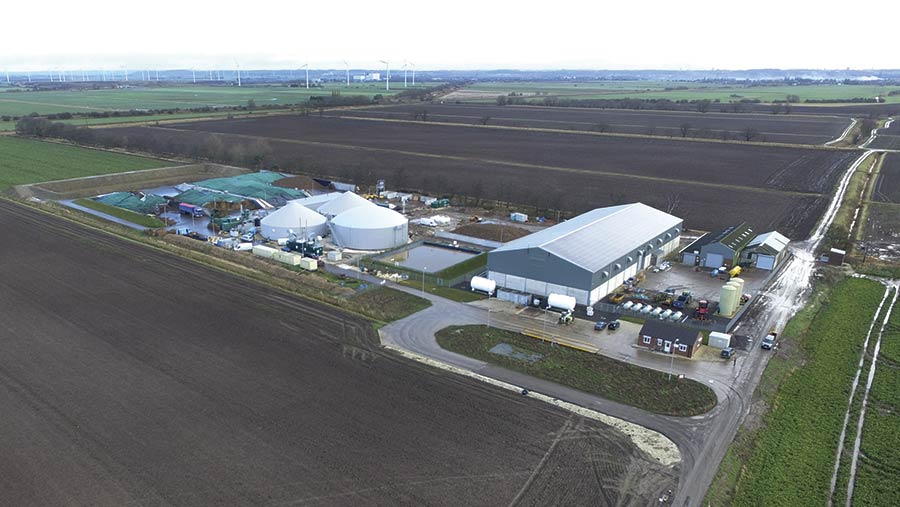Harper Adams University team takes 2016 Farmplanner title
 The Harper team (left to right): lecturer Tony Asson, and students Thomas Greenway, Anthony Ashby, Ed Calcott and Nicola Blowey
The Harper team (left to right): lecturer Tony Asson, and students Thomas Greenway, Anthony Ashby, Ed Calcott and Nicola Blowey A thorough and professional approach to issues faced by a complex business netted the Farmplanner 2016 award for the Harper Adams University team.
“Harper presented an ambitious plan, which, although reliant on substantial capital expenditure, showed a thorough understanding of the options open to the farm,” says Mike Johnson, agricultural business consultant with JH Walter, one of the sponsors.
The Harper team also identified the synergies between the separate farming, energy and contracting businesses based at North Moor Farm, near Crowle in South Humberside, better than the other teams, says Mr Johnson.
Ross Hewson is general manager for Rockscape Contract Services, which provides arable and energy contracting to the two related farming businesses and runs the large AD operation on the farm.
See also: Our Farmers Apprentice coverage
Development of the AD plant was very challenging, with two main contractors going into receivership in succession, and this diverted management attention and time away from the farming side of the business and from the contracting company, says Mr Hewson.
In the year to the end of March 2016, with crop prices low and the AD plant not yet at full capacity, the farming operation was barely profitable after accounting for BPS income and private drawings.
The contracting company was moderately profitable, while the energy operation was profitable, but operating well below its potential.
“The clear business-like approach by Harper from the outset was impressive, to measure where the business sits compared with others was a real eye opener for us,” says Mr Hewson. He and the team will develop and use the benchmarking format suggested by the Harper team, he adds.
Host farm – North Moor Farm, Crowle, South Humberside
- Total of 988ha arable across two related farming businesses – GR Bletcher and Bramall Farming
- Wide range of cropping – winter and spring wheats, energy beet, forage maize, winter rye, winter oilseed rape, winter barley and potatoes (on cropping licences to other growers)
- 5,000t grainstore built 2012, with 107kWp PV solar panels
- All on liquid fertiliser system
- First AD plant commissioned in 2014 had a very difficult start as the main contract installer went into administration, followed by a second installer a year later
- Set up in 2015, Rockscape Contracting Services provides arable contract services including labour, machinery, management and office services to the two farming businesses
- Rockscape also provides contracting and management services for Rockscape Energy’s MW AD operation, which buys feedstock energy crops from the two farming businesses

“Harper Adams presented their proposal in an organised, well-thought-out and professional manner. They were able to answer all the questions with solid, accurate answers.
“The students’ investigations confirmed that using contractors for the main farming operations is fully justified on both cost and performance grounds.
Swot analysis
“We use strengths, weaknesses, opportunities and threats [Swot] analysis to evaluate our business position, and Harper Adams produced detailed Swot analysis with interesting views; our Swot analysis will change to include some of those views,” Mr Hewson says.
As well as investment in contracting machinery, a satellite 5,000t maize clamp and a 9,000cu m digestate lagoon was proposed by the winning team.
“We will be investigating the off-site digestate lagoon stores suggested by Harper and the methods of moving and applying the digestate to land, although a tanker is seemingly the more feasible option rather than the umbilical system Harper costed.”
A satellite lagoon would improve timing of application in busy periods and reduce transport costs as the operation could be carried out at quiet times and would require only one man and one machine, says Mr Hewson.
“The livestock question was of particular interest to us and the answers varied significantly between the entries,” he adds.
“The poultry manure we already use as part of our feedstock in the AD plant played a big part in students’ decisions to include a poultry enterprise on the holding.
“However, Harper Adams went that extra mile and spoke to local chicken companies to investigate the opportunities available in the area. This attention to detail, repeated in other areas, edged them out in front of the pack.”
As well as a detailed analysis of strengths and weaknesses, the Harper entry used clear partial budgets to assess the impacts
of their suggested changes.
AD efficiency
The team identified the opportunity to increase AD efficiency by using additives and recommended investment of £2.18m in a 157,000-bird broiler unit, offering a big jump in profitability and a nine-year payback. This was after having investigated other livestock alternatives including dairy, pigs, beef and sheep.
For the farming operations, Harper suggested the two farming businesses be managed as one, with two main rotations, using digestate as a significant fertiliser replacement. Organic matter would also be further enhanced through cover crops.
Improved efficiency of the AD operation would also mean there would be 5,000cu m of surplus digestate to sell.
Barclays regional agricultural manager Craig Sigley was also on the judging panel.
The Harper Adams team had a clear plan, presented with passion and backed up by an in-depth knowledge of the supporting financial analysis and budgeting, Mr Sigley says.
Farmplanner of the Year – what is it?
- Run by the Institute of Agricultural Management (IAgrm)
- An estate or large mixed farm is chosen as a case study
- Aimed at agricultural students
- Teams visit the farm then are given several months to prepare a business plan
- Finalist teams present their cases to the judges
- Farm visit and awards presentation sponsored by JH Walter
- Also supported by Farmplan, Frontier Agriculture and Barclays
- Judges: Ross Hewson (Rockscape Contracting Services), Mike Johnson (JH Walter), Tim Brigstocke (IAgrM) Richard Cooksley (IAgrM), Craig Sigley (Barclays)
- Next year’s competition will be hosted by a Shropshire estate
Who entered?
- Bishop Burton College, East Yorkshire
- Harper Adams University, Shropshire
- Newcastle University, Newcastle upon Tyne
- Plumpton College, Sussex
- University of Nottingham
- University of Reading, Berkshire
Challenges set for student teams
- What opportunities might exist for sourcing additional feedstocks locally to feed the expanding AD plant, freeing up land for more traditional cropping?
- Maize, beet and hybrid rye are part of the rotation, offering bare land in the winter, how could this opportunity be used?
- What would you change about the current machinery, labour and use of contractors in order to increase overall efficiency? This may include the possibility of slight changes to peak periods and additional farmed area. All capital machinery purchases to be fully justified.
- The introduction of the AD plant has made the farm more mixed and diverse than traditional arable cropping. What possibilities are there to integrate livestock to extract further revenue from existing capital investment and the farm’s resources?
- The opportunity of using the livestock manure created as a feedstock for the AD plant or its value spread to land alongside the digestate should be explored.
Harper Adams business plan
- Use additives to maximise external feedstocks, AD efficiency and traditional cropping
- Use cover crops in forage rotation for organic matter and nutrient use over winter
- Invest in all machinery to optimise timeliness, efficiency and profitability
- Invest in main livestock opportunity of broiler chicken to generate more profit and AD feedstock
- Valuable digestate – only organic manure used due to NVZ N farm limit. Use cover cropping for additional organic matter
